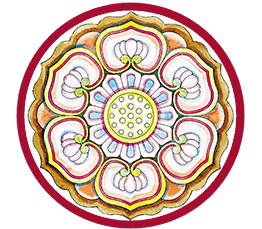Buddhism Q&A (3)
By Householder Fo'en
Q10: Becoming a Buddha and an immortal are not the same, right?
A: Of course not. Some people can’t distinguish among Buddhas, deities and immortals. Probably they were influenced by old ethics books with contrived terms such as "divine Buddha" or "immortal Buddha." Immortals are a type of ordinary being within the Six Realms of Rebirth. They may enjoy the five desires and possess certain supernatural powers in meditation, but they haven't attained complete emancipation.
Q11: Why is the Buddha called Fo (in Chinese)? What's the meaning of the term?
A: Fo is an abbreviation of Fotuo, the transliteration of "Buddha." Buddha means an "enlightened person," with three implications: (1) self-enlightenment; (2) enlightening others -- not only awakening oneself but also helping others become enlightened; (3) perfect enlightenment and practice -- one's wisdom and meritorious achievement have reached the highest and most perfect level in enlightening both self and others.
Q12: So, we have to be a monk to study Buddhism?
A: Not necessarily. Shakyamuni Buddha later taught people a way to achieve full liberation without renunciation. It is to recite the name of Amitabha Buddha, gain rebirth in the Pure Land and attain Buddhahood there.
Q13: After becoming a Buddha and attaining the highest levels of merit, what else did he do?
A: To deliver sentient beings from the suffering of samsara, Shakyamuni Buddha traveled widely; many who heeded to his teachings gained liberation. First, he went to Sarnath in Benares (Varanasi) and found the five followers who practiced austerities with him. He taught them the Dharma. The five converted to his teachings and formed the very first Buddhist Sangha. In Buddhism, the Buddha's first discourse is called "the initial turning of the Dharma wheel."
Q14: Why is it called the "turning the Dharma wheel"?
A: One of the seven treasures of the chakravartin is the chakra, or wheel. It can break mountain rock and cannot be impeded. Buddhism uses the chakra of the chakravartin as a metaphor to indicate that the Dharma can cut through the hardened negative karma and afflictions of sentient beings. Moreover, the Buddha did not stop with a single person or place while giving his teachings. He was on the move, instructing many -- like a turning wheel. So Buddhism calls the Buddha's discourses on the Dharma the "turning of the Dharma wheel."
Characteristics
- Recitation of Amitabha’s name, relying on his Fundamental Vow (the 18th)
- Rebirth of ordinary beings in the Pure Land’s Realm of Rewards
- Rebirth assured in the present lifetime
- Non-retrogression achieved in this lifetime

The 18th Vow of Amitabha Buddha
If, when I achieve Buddhahood, sentient beings of the ten directions who sincerely and joyfully entrust themselves to me, wish to be reborn in my land and recite my name, even ten times, should fail to be born there, may I not attain perfect enlightenment. Excepted are those who commit the five gravest transgressions or slander the correct Dharma.
Guiding Principles
Faith in, and acceptance of, Amitabha’s deliverance
Single-minded recitation of Amitabha’s name
Aspiration to rebirth in Amitabha’s Pure Land
Comprehensive deliverance of all sentient beings
